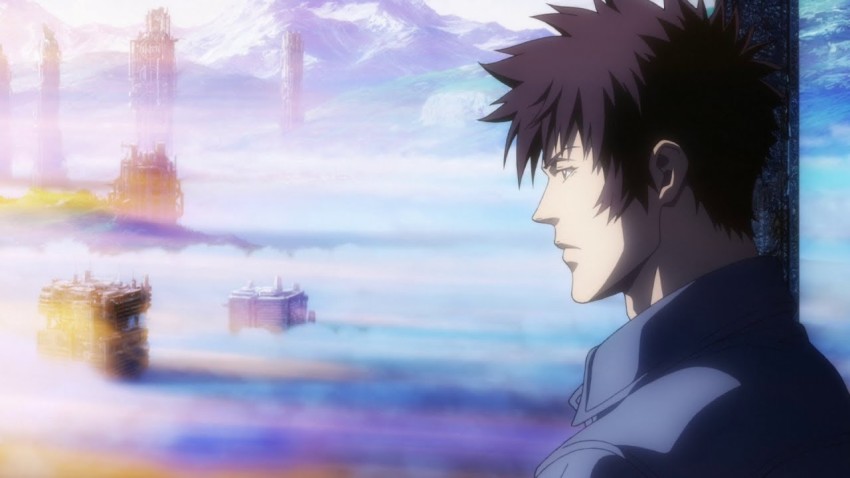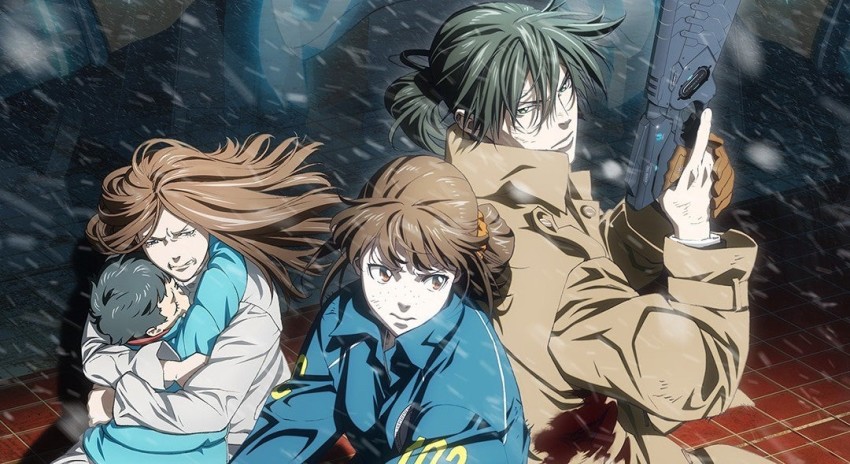Sinners of the System
October 3, 2019 · 0 comments
By Andrew Osmond.
 PSYCHO-PASS envisions a world where Japan is a socially-ordered utopia, thanks to the Sibyl System – a surveillance giant that tabulates everybody’s “Crime Coefficient” data to make sure nobody is even planning on committing a crime. Its drama revolves around the nature of freedom and criminality in that future world – heavy shades here of Minority Report, but also on the peculiar lives of its Enforcers, many of whom are only a couple of negative internet posts or flagged driving licences away from being criminalised themselves. PSYCHO-PASS: Sinners of the System represents the return of the dystopic franchise following the 2015 film. The new anime is a trio of separate sixty-minute movies – Crime and Punishment, First Guardian, and On the Other Side of Love and Hate.
PSYCHO-PASS envisions a world where Japan is a socially-ordered utopia, thanks to the Sibyl System – a surveillance giant that tabulates everybody’s “Crime Coefficient” data to make sure nobody is even planning on committing a crime. Its drama revolves around the nature of freedom and criminality in that future world – heavy shades here of Minority Report, but also on the peculiar lives of its Enforcers, many of whom are only a couple of negative internet posts or flagged driving licences away from being criminalised themselves. PSYCHO-PASS: Sinners of the System represents the return of the dystopic franchise following the 2015 film. The new anime is a trio of separate sixty-minute movies – Crime and Punishment, First Guardian, and On the Other Side of Love and Hate.
One comment it’s worth making at the start, given the franchise’s gruesome reputation, is that these stories are more about investigations and interesting mysteries than grand guignol gore. The original TV series felt like the SF anime equivalent of the gruesome live-action Hannibal series. PSYCHO-PASS 2, notoriously, was even grislier. As the Sinners films aren’t made for TV, their content could have gone further still; instead they dial the gore back considerably, though there are gruesome moments. Horror fans, of course, are quick to complain about reduction of gore in a franchise, which is usually done to get a lower certificate, but PSYCHO-PASS was always much more than a splatter vehicle.
The first Sinners episode, Crime and Punishment, starts with the appearance of a woman in Tokyo with the kind of Crime Coefficient that would normally get her killed instantly in PSYCHO-PASS’s brave new world. However, she gives herself up to police, and turns out to be a former counselor from a secretive installation, Sanctuary: this is located in the wintry landscape of Aomori in the north of Japan. Very quickly, the woman is claimed by Sanctuary, and it’s clear Unit One’s help is no longer required… but Tsunemori is able to get some of her personnel to escort the prisoner north. They include the Enforcer Ginoza, and the Inspector Mika Shimotsuki… who, if you remember PSYCHO-PASS 2, was a dangerously unstable hothead, less an ally than an adversary.
Nonetheless, that’s who Tsunemori dispatches to Aomori, to find out why on earth one of their staff went berserk. Sanctuary is ostensibly a benign institution, dedicated to the rehabilitation of latent prisoners, and even allowing them to live and work together (Sanctuary is located over a mineral-rich mine). Mika and Ginoza find their investigation blocked, until a clue left by the runaway woman leads them to a second fugitive still hiding from Sanctuary. From then on, the story becomes a chase-action thriller, where Mika is reminded that her job isn’t just about upholding the law – there’s also the small matter of protecting the innocent.
This is largely a mystery-procedural-chase film, framed against the frozen landscape of Aomori, with the action largely kept back to the finale. It includes a impressive set-piece fist-fight down cliffs and through shattering ice; mecha are involved but also discarded for the personal bone-crunching Bondian touch. The story makes a sardonic point about communal values, but viewers may be more interested in seeing how Mika is presented in a more positive light. It’s less that we see a better side of her, and more that we see how her fundamentally manic nature can be deployed for good or bad just as easily (which has certain implications in PSYCHO-PASS’s world).
 Viewers may cry foul at another female character’s come-uppance, which turns on a trick so old and obvious that it’s surely forbidden in most police dramas. But it makes a fair amount of sense given the character’s established mindset and assumptions. Remember, PSYCHO-PASS is a different country, whose inhabitants don’t think like “us.”
Viewers may cry foul at another female character’s come-uppance, which turns on a trick so old and obvious that it’s surely forbidden in most police dramas. But it makes a fair amount of sense given the character’s established mindset and assumptions. Remember, PSYCHO-PASS is a different country, whose inhabitants don’t think like “us.”
The second film, First Guardian, is a prequel story, set before the original series, and giving us the chance to see much-missed characters back in action, like Masaoka, Ginoza’s detective dad. The central character, though, is a young version of Teppei Sugo, previously seen in PSYCHO-PASS 2. First Guardian is set before his Hue clouded and he became an Enforcer, back when he was operating drone planes for the Japanese army. In contrast to the snow of the former episode, much of “Guardian” takes place against the balmy beaches and waves of Okinawa.
Again it’s a mystery story, involving a battlefield tragedy and a subsequent series of terror attacks in Japan. To his amazement, Sugo learns he is a suspect; another is an old comrade who supposedly died in conflict. That’s when Sugo runs into Masaoka, although the detective is given his own space in the film; he has time for strong family scenes with loved ones who no longer acknowledge him because of illness or hate.
Otherwise First Guardian in a conspiracy thriller with clear echoes of Patlabor 2, the first great touchstone title of Production I.G. While it has more action and bloody violence than that austere classic, it shares several of Patlabor 2’s elements. There are soldier characters betrayed by their leaders; a shadowy theoretical “villain” who we’re not sure is alive or dead; and condemnation of soldiers being insulated from the carnage they leave on battlegrounds where they don’t even set foot. Most notably, there’s a specific shot in Guardian of a terror attack that evokes a similar moment in Patlabor 2. The attacks are seen only briefly and elliptically – another hallmark of the work of Mamoru Oshii, Patlabor 2’s director
The third story, On the Other Side of Love and Hate, functions as a follow-up to the first PSYCHO-PASS movie (a midquel, if you will), focusing on the character of Shinya Kogami, left behind somewhere in South Asia (geography seems a little bit confused about which side of the Himalayas he is on), where he becomes embroiled in a hostage situation involving terrorists and a bus full of innocents. A girl named Tenzing begs Kogami to teach her how to exact revenge on those who have wronged her, leaving him with a difficult dilemma – Japan in this dystopian future has already tried exporting justice to the rest of Asia… can it also export rough justice…?
The three films excel at taking the characters and the drama away from both their usual ensembles, and the cityscapes of future Tokyo, plunging them into still snowscapes, and dun-coloured Tibetan-Nepalese mountainsides. All three Sinners films were directed by our old friend Naoyoshi Shiotani, who’s been with the franchise from the start. On the evidence of these new absorbing, enjoyable films, Shiotani isn’t hidebound by PSYCHO-PASS’s guignol heritage; he believes all it really needs are solid, interesting stories.
PSYCHO-PASS Sinners of the System 1-3 is screening at Scotland Loves Anime.
Leave a Reply